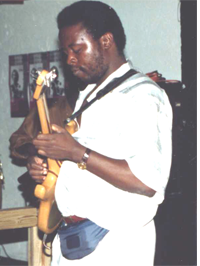|
 Diblo Dibala (Yancomba Dibala), Congolese guitarist; born Kisangani, Congo-Kinshasa, 1954. Diblo Dibala (Yancomba Dibala), Congolese guitarist; born Kisangani, Congo-Kinshasa, 1954.
Diblo earned his musical reputation in Paris, but he began his career in Congo-Kinshasa, playing in relative obscurity with Bella Mambo, an offshoot of the popular band Bella Bella. Together with singer Kanda Bongo Man, Diblo left Bella Mambo to form Bana Mambo (the children of Bella Mambo), a group that recorded a few sides and played club dates for two years with only limited success. Diblo worked briefly in a re-united Bella Bella in 1979 before selling his guitar to raise air fare for a move to Brussels.
By 1981 Diblo had re-located to Paris where he collaborated with Kanda to make a record for the new Afro Rythmes label run by record dealer Ouattara Moumouni. Playing behind Kanda with only guitars, bass, and drums for support, Diblo refined the uptempo riffing that would become his personal trademark and the essence of the Congolo-Paris sound called soukous. The success of Iyole (1981) and Djessy (1982) with Kanda led to an increasingly heavy schedule of session work with other Paris-resident Congolese musicians. Diblo worked with Kanda on several other albums including the popular Malinga (1985). He backed Congo-Brazzaville singer Aurlus Mabele on Africa Mousso (1986), and returned for a final date with Kanda on Sai-Liza (1987).
Following Sai-Liza, Diblo and Mabele formed a loose-knit band called Loketo to back each other's solo projects and issue an occasional group recording. The two embraced new studio technology, building their music around the unrelenting precision of the durm machine and spiking it with a synthesizer's whine. Super K and Trouble, both from the late eighties, employed lyrics of minimal import and raced with a swiftness that caused observers to dub it TGV soukous after France's high-speed trains. Diblo parted with Mabele in 1990 to form his own group, Matchatcha, which continued to de-emphasize lyrics in favor of breath-taking dance grooves.
It didn't matter that the speedy style of Diblo and his Parisian colleagues found little favor back in Kinshasa and Brazzaville where music lovers preferred meaningful lyrics set to a gentler rumba. Economic devastation and political turmoil in the two Congos severely reduced their importance as marketplaces for music. Diblo's TGV soukous aimed successfully at a better-off international audience. Despite the formulaic nature of much of his work, Diblo's handling of the guitar stands out. His collaboration with Kanda Bongo Man produced some of the finest soukous tracks of the eighties.
© 2011 Gary Stewart
SELECT DISCOGRAPHY
With Kanda Bongo Man: Amour Fou/Crazy Love (Hannibal HNCD1337) 1987; Kwassa-Kwassa (Hannibal HNCD1343) 1989.
With Loketo: Super Soukous (Shanachie SH64016) 1989; Soukous Trouble (Shanachie SH64025) 1990; Extra Ball (Shanachie SH64028) 1991.
With Matchatcha: Laissez Passez (Afric'Music AM07CD) 1992; O.K. Madame (Afric'Music AFRCD8715) 1993; Aimer La Danse Nyekesse (Afric'Music AFRCD8717) 1994; My Love (Atoll Music 8660) 1996; Iwooh: Crie de Joie (Mélodie 02111-2) 2000.
SELECT BIBLIOGRAPHY
T. Cheyney & C.C. Smith, "Loketo: Shake Your Hips," The Beat (vol.8, no. 6, 1989); R. Sanders, "The Fastest Guitar in the West," Take Cover (vol. 1, no. 1, 1990); G. Stewart, Breakout: Profiles in African Rhythm (Chicago, 1992); G. Stewart, Rumba on the River (London and New York, 2000).
|

